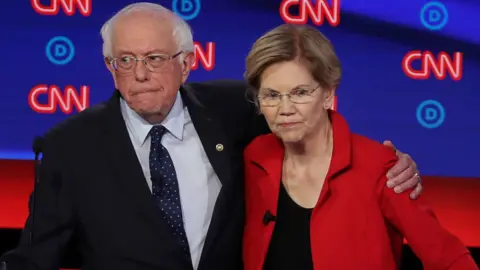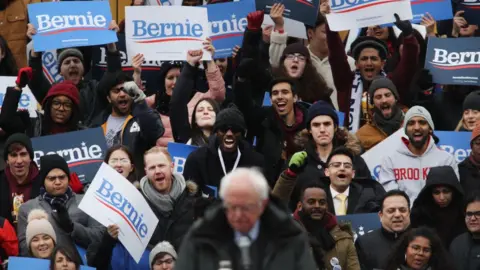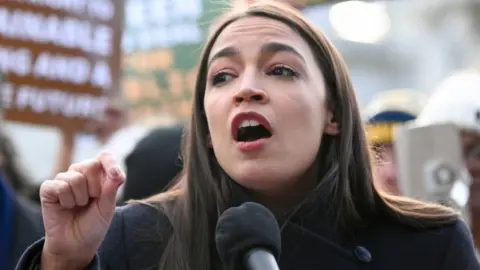Will UK provide light bulb moment for US Democrats?
 Getty Images
Getty ImagesFor the most part American politics exists in its own bubble with its own preoccupations. But every now and then something that happens in a foreign country intrudes. And pokes its nose in. Big time.
The 12 December 2019 UK General Election might be such a moment for the US Democratic Party - just as British politics imposed itself on the US presidential election on 23 June 2016, when the British people voted for Brexit. Coincidentally, Donald Trump arrived in Scotland the following day (not the day before as he has repeatedly claimed) and what the British people had just done was a galvanising moment in his campaign, a light bulb moment, as he prepared to face the American people five months later.
So what should Democrats learn from the misery that befell the Labour Party last Thursday night? And more particularly can they afford to have Bernie Sanders or Elizabeth Warren as their candidate and stand a chance of defeating Donald Trump in 2020 after the shellacking meted out to Jeremy Corbyn and his brand of radical, left-wing policies?
Mind-boggling
Let me start in Sedgefield in County Durham, an old mining constituency, whose pits closed in the 1970s and 1980s. It is a largely white, working class area. It has been rock-solid Labour since the dinosaurs roamed the Earth. It is not unlike any number of towns you could find in the Appalachians in Pennsylvania.
I've spent a bit of time there from when I was writing a long forgotten biography of Tony Blair in the mid-1990s through to when he became prime minister.
 Getty Images
Getty ImagesIn the village of Trimdon is the Labour Club. The last time I was there, Tony Blair was pulling the winning numbers out in the raffle: main prize a turkey (plucked), second prize a pound of sausages. The people I met there were decent, hard-working, straight-talking - and small "c" conservative. They had chosen Tony Blair as their candidate for the 1983 election because he wasn't on the "loony left" wing of the party, as his election agent explained to me over a pint in the Dun Cow Inn in the constituency.
I reported from the nearby leisure centre in 2005 when Tony Blair won the seat for Labour with a huge majority, and won his third successive general election. The people of Sedgefield had delivered him a majority of over 18,000 and 58% of the vote. No-one else came close.
But last Thursday night incredibly, unbelievably, ground-shakingly, Sedgefield went Conservative. Sedgefield. Conservative. It is mind-boggling.

- WHO WON IN MY CONSTITUENCY? Check your result
- NATIONAL PICTURE: The result in full
- ALL YOU NEED TO KNOW: The night's key points
- MAPS AND CHARTS: The election in graphics
- BREXIT: What happens now?
- IN PICTURES: Binface, a baby and Boris Johnson

Remember, when Blair won with that gargantuan majority in 2005 he was at the height of his unpopularity - or the nadir of his likeability (whichever way you want to put it). The controversial Iraq War had been two years earlier and there was a strong feeling that Britain had gone to war on a false prospectus. No weapons of mass destruction had been found, and - hugely uncomfortably for Blair - the father of a British soldier who had died in conflict there stood against the prime minister as an anti-war candidate.
Blair, by now, was no longer seen as the great hope, but as smarmy, President George W Bush's poodle, in the pocket of big business - and a war criminal. It was ugly. And yet he romped home on his "third way", left of centre, progressive ticket. And he was returned as prime minister with a comfortable majority: a third successive election victory, a feat that no other Labour politician in history had achieved.
Seismic change
 Getty Images
Getty ImagesBut the policies of Labour in the 2019 election are very different from what they were in 2005 when Tony Blair and the so-called "modernisers" held sway. Labour last Thursday went into the election with an unashamedly socialist set of policies, promising a massive increase in government spending, and big tax increases for the well-off. Nationalisation of some industries was back on the agenda. There would be massive increase in spending for the National Health Service - and an offer of free broadband for everyone. Why no offer of free puppies for all, one wag asked derisively.
The problem is that the pragmatic, working-class people of Sedgefield - and any number of other constituencies across the industrial towns and cities of the UK - held their collective noses and said you must be joking. These are smart, savvy people. They know that you don't get something for nothing.
Electoral districts that all my life have been Labour - Blyth Valley, Bolsover, Rother Valley, Newcastle-under-Lyme, Dudley, Grimsby - are now held by the Conservatives. It is hard to overstate just how seismic this is. And remember social class in the UK has always been a bigger determinant of how people vote than it has been in the US. Just like the whole class system, frankly. Some of these constituencies have never, ever flirted with the right.
Of course, there is a massive caveat that makes reading across from what happened in the UK to what might happen in the US precarious. Brexit, no deal, the European Union Withdrawal Agreement will not be on the ballot in the 2020 US presidential election. Brexit did play a big part in this general election - how could it not given the turmoil in Britain of these past three-and-a-half years?
But as Phil Wilson, the man who succeeded Tony Blair as the Labour MP in Sedgefield - and who lost his seat on Thursday night - pointed out, Brexit was nothing like as big an issue on the doorstep as Jeremy Corbyn and Labour's socialist policies.
Kitchen table issues
Democrats would be wise to dig deeper into the reasons for such wholesale rejection of the UK Labour Party. If you are plotting a path to victory in 2020 that takes you through Pennsylvania, Michigan and Wisconsin - the three states that the Democrats lost in 2016 by a teeny, weeny number of votes and that guaranteed Donald Trump victory - then there are many similarities between these states and the industrial heartlands that Labour have just lost.
Michigan's Democrats swept the board in the midterms in 2018, and the newly-elected Governor, Gretchen Whitmer, is admirably straightforward about why they were able to turn around the fortunes of the Democratic Party after the shock of 2016. They didn't promise the earth, they promised to fix the roads. Kitchen table issues.
 Getty Images
Getty ImagesBut among the radical/socialist/progressive/liberal (choose your epithet) wing of the Democratic Party there is an ambition, a hunger for earth-shaking pledges. The bold Green New Deal, Medicare for all (which to those of us who are European may not seem such a giant leap) - these are big ticket policy ambitions with even greater price tags attached.
But will they fly in a country where the centre of political gravity is much further to the right than it is in the UK? Promising bigger government and higher taxes may not be impossible. But it's not going to be an easy sell.
I saw two sets of statistics that really struck me. In last Thursday's election, it seems 58% of 18-24 year-olds voted Labour. Only 16% of those over 60, it's estimated, voted Labour. Similarly, the percentage of Democrats under 30 and qualified to vote in the primaries who are backing either Bernie Sanders or Elizabeth Warren is massive. Something like 70%. Everyone else in the field is an also ran. But look at any statistics on election turnout, and you will see it is those infuriating oldies who vote in the highest numbers.
Grasshoppers and cows
And to Democrats in the US who look at their Twitter feeds and see the "likes" and retweets mounting up as they advance this or that position, let the 2019 UK election be a warning to you.
 Reuters
ReutersFor some Labour activists the result of the election seems to have come as a massive shock, because in the echo chamber world that we all now to a greater or lesser extent live in, you come away with the impression that everyone thinks like you. Twitter is not the real world. Nowhere near.
In the 1980s and 1990s when protestors would take to the streets of London over the Poll Tax or the siting of American cruise missiles at Greenham Common or more recently the Iraq War, and most recently the huge protest marches backing Remain, the participants would often claim that because so many people had come out onto the streets this was the view of the British people. But for the million who may have protested (still a huge number), there were 59 million who had stayed at home.
American Democrats need to be mindful of this. People like Congresswoman Alexandria Ocasio-Cortez may be a social media genius (and she is), and she may have a massive number of followers (and she has), and be charismatic (and she has that by the bucketload) - but America is a big country with an awful lot of voters who are not signed up to all the "woke" things she and others might be advocating.
The best voice on this is from a pre-tweeting, pre-electronic media, pre-opinion poll age - and it is from the 18th-Century Anglo-Irish philosopher, Edmund Burke. He wrote:
"Because half a dozen grasshoppers under a fern make the field ring with their importunate chink, whilst thousands of great cattle, reposed beneath the shadow of the British oak, chew the cud and are silent, pray do not imagine that those who make the noise are the only inhabitants of the field."
Labour in the UK lost the working class, but gained the woke. And that will give the party sleepless nights over the coming months and years. It was their worst defeat since 1935.
I watched the UK election on Thursday night from the British Embassy in Washington, where the toast of Washington society met and mingled as the results came through. A smart friend of mine had to leave early to go to another event. She contacted me the next day to say that she went to a dinner and was seated next to a Democrat senator.
As she sat down he leaned over to her and said "Are you following what's going on in Britain? Labour getting clobbered? We Dems in the US had better pay close attention."

Who will take on Trump in 2020?

